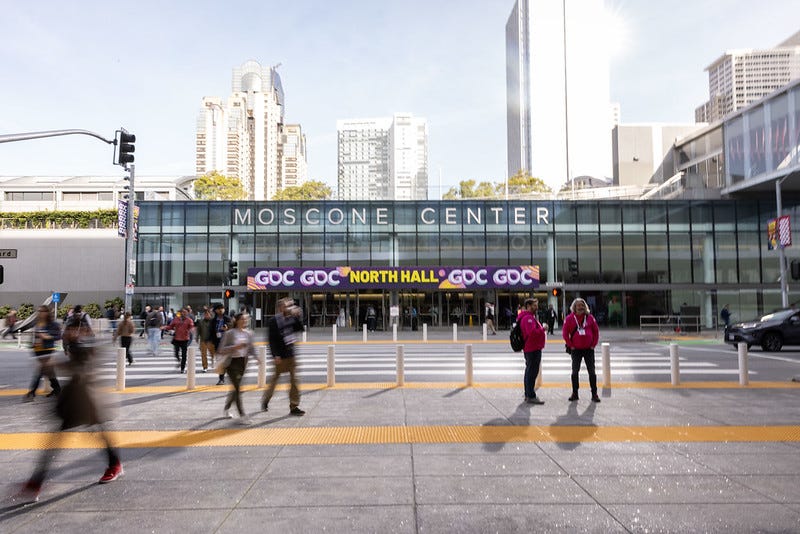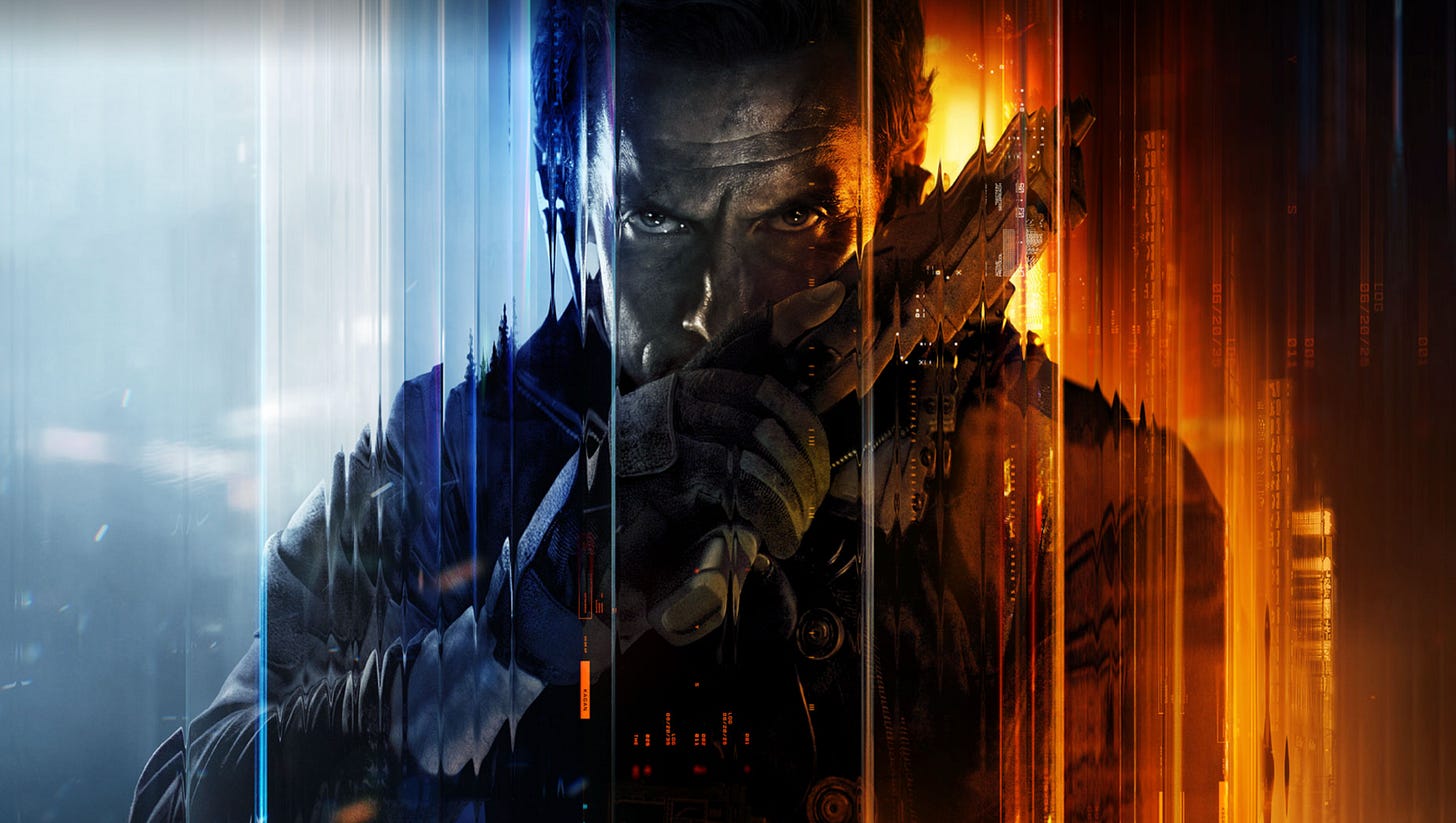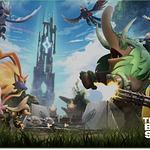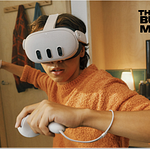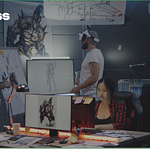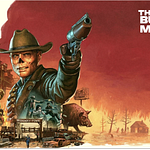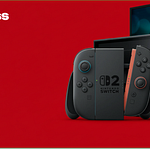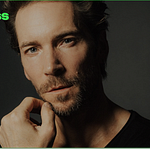Listen now on Apple, Spotify or YouTube
In This Edition
- GDC’s comeback
- US video game market is growing
- Our view on the ROG Xbox Ally (Show only)
Hello! It’s a bumper edition this week.
First, we interviewed GDC director Mark DeLoura, where we discussed some of the big changes taking place at the conference this year. We also spoke about the challenges of hosting the event in the US, and how he felt about big companies skipping GDC this past year.
In addition to Mark, Circana game boss Mat Piscatella joins us as our guest host on The Game Business Show, and he shared extra insight into the US market, which is performing a little better than expected.
You can listen to or watch the whole thing above. Or alternatively, we have all the key quotes and information in the articles below. Whether you’re listening, watching or reading, I hope you find it useful.
Enjoy!
GDC to absent companies: Do you even care about developers?
Big companies who skip GDC are sending a message to developers that they don’t care, the event organiser warns.
The San Francisco-based conference is undergoing a major revamp next year, with a new ‘festival’ approach and cheaper tickets. It hopes that a broader approach to the schedule, working with more partners across the week, and a simplified ticket structure, can arrest a decline in exhibitors.
Big organisations such as Unity and Epic cut back their activity with GDC during its last event in March 2025.
“It was noticeable last time,” admitted Mark DeLoura, executive director of innovation and growth at GDC.
“As an attendee, I was disappointed not to see Unity and Unreal on the show floor. I worked for Sony and I started the Sony booth 25 years ago… not to see Sony on the show floor is just disappointing. I really feel like you’ve got so many developers there, you’ve got to have a front door. Of course, these companies are going to have their own events, they have their own communities they need to foster, and they can talk about things that are more NDAd at their own events that they may not want to do at a public show. But you’re not going to find the independent developer who doesn’t already know somebody at your shop, unless you’re there with your door open.
“Isn’t that the purpose of conferences? Meeting new people. You’ve decided you don’t want to meet new people, I guess. I can’t understand that. There’s more to it than that, of course. There are costs, etcetera. But developers get the vibe. If you’re not there, or appear not to be there, are they sure that you care about them? That’s what I don’t understand.
“I would say this, because that’s why I got Sony involved in GDC in 2001. We needed to be there. We needed to be there for the developers. It’s important.”
DeLoura told us that next year’s GDC: Festival of Gaming will include a transformed expo space, which is now called ‘Festival Hall’. It will work with other locations throughout the city to put on networking events, including for groups of people outside of the development community. And the conference will introduce new and returning formats, such as debates, fireside chats and keynotes.
And the main Festival Pass, which covers the majority of the event, will be 45% cheaper than before.
“The company really wants to invest into the conference this year,” he explained. “So, they’re giving us the freedom to make lots of changes. And we’ve run the numbers, we think if we put the price point here, which is 45% down from last year, that we will get more people coming up, some people will come down, and it will net out in the middle.”
One of the bigger challenges for GDC next year is in attracting international attendees. Some industry professionals from outside of the US have expressed safety concerns due to the political situation in the country.
DeLoura admits there’s only so much GDC can do to alleviate concerns, but it’s hoping by starting earlier, it gives individuals more time to prepare.
“It gives people more time to get their VISAs and things sorted out,” he told us.
“We’re talking a lot to the administration and City officials, to see if there are things we can do. And of course, there’s not a lot we can directly do, but there are things we can indirectly do, and we’re trying to do those things. We definitely understand those concerns. I have those concerns when I travel. Plus, we want this to be a global celebration, and we are trying to invite in people from places we haven’t heard from before, and some people might think it’s a risk to come. We’re going to do our best to get them to come.”
“We are doing all the things we can to make sure people are comfortable with San Francisco.”
Some of that involves making San Francisco feel safer for attendees. The GDC Board frequently discusses whether to host the event elsewhere, but has ultimately decided to stick with the city.
“Everybody brings it up,” DeLoura says. “It’s absolutely something we talk about. For [doing the event in] the US… it is the center of the game industry. Wouldn’t you want to be there? And don’t more game developers have the opportunity to come because we’re there?
“Yes, and… San Francisco is expensive. It’s a pricey place to be. People are concerned about the city’s safety, which has definitely improved in recent years.
“We are embracing San Francisco as the hub for game development in the US. And then working to solve problems. How can we make it easier? Can we reduce the pass costs? Yes, great, hopefully that will bring new people. Can we improve safety? Yes, great, we are going to partner with the City and the Police. We are going to have a safety hotline that you can call if you need someone to walk you to your hotel, or you need to report something. We’re setting that up. We are doing all the things we can to make sure people are comfortable with San Francisco.”
US video game market is beating expectations, but all things rest on Call of Duty
The US video game market may grow this year after all, following another big month for game sales.
US market tracker Circana revealed there had been a 10% growth in video game revenue during September, driven by a stronger slate of games, a big launch for Borderlands 4, improved console sales (due to Switch 2), and another month of growth for video game subscriptions.
And now the data firm is considering revising its outlook for the year. Circana had expected the US game market to drop 4.7% over 2024 following the delay to Grand Theft Auto 6.
“We are in a better market position in terms of consumer spending in the US, certainly than I thought it would be,” said Circana game boss Mat Piscatella in today’s episode of The Game Business Show. “But this is the first three quarters, and as you know, the story is always told in the fourth quarter.”
Ultimately, a lot will rest on the launch of Call of Duty: Black Ops 7 next month.
“I’ve been looking at my forecast thinking I should change it,” he said. “There are reasons to be optimistic for growth year-on-year, which I never would have thought possible earlier in the year. It’s been really driven by something I wasn’t expecting, and that is just how much prices have increased. Overall unit demand for video game stuff… it isn’t really growing that much. It’s the higher prices across everything that has caused those numbers to go up.
“There are lots of reasons to be optimistic, but ultimately in the US at least, Call of Duty is really going to tell the tale. If Call of Duty misses, or if Battlefield did eat some of Call of Duty’s lunch, then we don’t get to growth. But if Call of Duty maintains its performance, or grows, then we should be pretty comfortable with a growth assumption. In the US, Q4 kind-of revolves around Call of Duty, and everything else is a distant second.”
Here are some other key things we learned from Piscatella on the Show:
Borderlands 4 enjoyed a record-breaking launch for the 2K shooter, with revenue up 30% compared with Borderlands 3. “We’ll have to see the legs, because what we’re seeing is that the initial launch for some games have become a bigger part of the story than in the past,” Piscatella said. “That more affluent, higher income spender is really taking on more of the burden of sales. So perhaps it’s just a bigger launch, and the tail will drop off, or perhaps the tail will stay strong. I know it’s discounted right now in the US across several digital storefronts, and we’ll see how it goes.”
PS5 exclusive Ghost of Yotei posted strong opening week sales in the US, matching the performance of its predecessor: Ghost of Tsushima on PS4. It follows a similar result for the game in Europe. Piscatella believes it’s a strong result considering that Ghost of Tsushima launched during the COVID-19 lockdowns, which drove record video game sales globally.
“And the install base on PS4 [when Ghost of Tsushima came out] was meaningfully higher than the PS5 is now,” he added. “But week one is week one, we need to see a larger sample of time to see where it really sits. But it was pretty darn good [launch].”The blockbuster Battlefield 6 launch has been driven by PC, Piscatella reveals. He told us: “We’re not announcing sales just yet. But on an engagement basis, I have been impressed by its strength on PC. In terms of the user numbers, it is doing incredibly well. It’s amongst the best we’ve ever seen for a premium game on PC. But on the console side, [Battlefield 6] is Top 15, Top 10… In the US, that PC audience is where Battlefield has really hit. On the console side it’s done well, but probably a little bit less than I thought it would.”
Finally, Piscatella believes gamers are less willing to try new game concepts due to the sheer amount of noise in the market. “As more and more games come out, there is more and more noise, and that causes more and more people to shrink into the games and franchises they know,” he said. “You get a Borderlands 4, you get a Ghost of Yotei, and it’s ok, people know those, and people are more comfortable getting into them. But the games that aren’t at this mega franchise level… it’s much dicier. And review scores don’t carry as much weight as they used to. I would even argue that influencers don’t carry as much weight as they used to, because there’s so much noise.
“Take Silent Hill F, it was pretty strongly received. But it did not sell what the Silent Hill 2 remake sold in its launch period [in 2024]. In fact, it’s more than a bit behind. So, what’s going on? And it’s that idea of comfort. ‘I know [Silent Hill 2], I feel comfortable getting into that, and for everything else I’m going to wait. Because the choices are overwhelming’.”
He added: “You look at the conversation about how we need to make more games faster and cheaper… it’s going to make these problems so much worse.”
That’s it for today. But we have a lot more to come, including a live Show recording with former Xbox, EA and Sega chief Peter Moore (Friday), the latest European charts (also Friday), the next edition of The Game Business Micro (Monday) and a big interview with Patrick Soderlund, the CEO of Arc Raiders developer Embark (Tuesday). Until then, thank you for reading.



